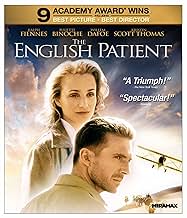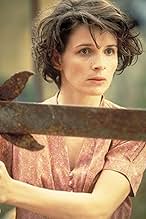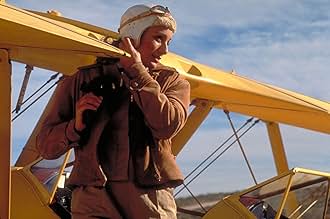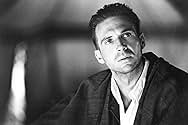À la fin de la Seconde Guerre mondiale, une jeune infirmière s'attache à la victime d'un accident d'avion, grièvement brûlé, et dont le passé, raconté en flash-backs, recèle une histoire d'a... Tout lireÀ la fin de la Seconde Guerre mondiale, une jeune infirmière s'attache à la victime d'un accident d'avion, grièvement brûlé, et dont le passé, raconté en flash-backs, recèle une histoire d'amour fatale.À la fin de la Seconde Guerre mondiale, une jeune infirmière s'attache à la victime d'un accident d'avion, grièvement brûlé, et dont le passé, raconté en flash-backs, recèle une histoire d'amour fatale.
- Director
- Writers
- Stars
- A remporté 9 oscars
- 62 victoires et 78 nominations au total
Avis en vedette
The English Patient may be a slow movie, with all the dates, character relationships and events unfolding at a purposefully leisurely pace, but it is also intensely moving, beautifully shot and compelling. The film looks stunning, the dessert scenes especially are reminiscent of the epic sweeping feel that Lawrence of Arabia had. The cinematography is incredibly beautiful, and the costumes and scenery are wonderfully lavish and evoke the period seamlessly. The English Patient has a truly haunting and heart-wrenching score, particularly in the end credits, complete with some fitting music choices. The film also has a poetic and thought-provoking script, a compelling story that conveys the characters' predicaments wonderfully complete with flashbacks that enhance rather than jar and superb direction by the late and very talented Anthony Minghella.
The English Patient has a strong emotional impact as well, the climatic sequence in particular moved me to tears that stayed long after the movie was over. The characters are richer and more complex than one might think, Almasy especially is very haunted and pained, and dealt with in an incredibly subtle way. The acting does perfect justice to these characters, Ralph Fiennes is absolutely brilliant in one of his best and more complex performances(I'd say only Schindler's List is better), and Kristen Scott Thomas shows a great chemistry with him, the scene where she is carried out of the cave by him is one of extreme pathos. Juliette Binoche is equally affecting, and Willem Dafoe and Kevin Whately are as strong as ever.
All in all, a moving and beautiful film, cinematically and emotionally. 9/10 Bethany Cox
I'm sure many of those who hated it are much like a co-worker of mine who said "Books? I haven't a book since I had to in high school." I checked some of the names of the people who reviled this movie and sure enough it seems many of them think Armaggedon was an "awesome" movie and Chris Farley was a "Comic genius". And that's O.K. Taste is an individual thing.
My sensibilities tell me that the english patient is a very good movie that takes effort to appreciate. Much in this movie is very subtle. It is not a vacation for the brain.(Hey, sometimes the brain NEEDS a vacation, and stupid movies provide that!) Also, it is not a cynic's movie. It's about idealism, tragedy and regret. About how people can want the best but have it all fall apart because of bad choices, and have to go on with the regret of never being able to remedy the situation. Not so much a love story as a tragic one. So many people destroyed because of the selfishness of two people couldn't(wouldn't?) control themselves.
I would ask those who thought the movie boring to watch it again when you feel able to pay full attention to what's going on in the film and how different bits of dialogue dovetail into subtle suggestions of how the characters are feeling and thinking. This movie takes an investment of time, thought and emotion. If this investment is made, I think most people who watch it will feel rewarded.
During the war, a man (Ralph Fiennes) is discovered in the burning remnants of a crashed plane. With his face scarred beyond recognition, and with the man seemingly suffering from amnesia, he is assumed to be an Allied soldier, and is simply referred to as "the English patient." After the war, in the mine-ridden hills of Italy, a kind nurse, Hana (Juliette Binoche), who has apparently lost everybody close to her, remains in a ruined monastery to look after the dying man. Over time, she comes to learn more and more about her "English patient," who is actually revealed to be a Hungarian geographer, Count Laszlo de Almásy. Rather than losing his memory in the plane crash, we learn that this scar-ridden man has perhaps chosen to forget his past, both to protect himself from persecution and to cure himself of the tragic memories of his past love. Via numerous flashbacks, we learn of Almásy's former exploits in the Sahara desert, and his romantic liaison with a married woman, Katharine Clifton (Kristin Scott Thomas).
It's certainly easy to see why 'The English Patient' was so successful at the Oscars. It is such a beautiful film, blending the quiet beauty of the Italian countryside with the endless golden sands of the desert. Cinematographer John Seale captures the landscape to perfection; not since David Lean's magnificent 'Lawrence of Arabia' has a film shown the desert with such beauty and grandeur, making particularly good use of sweeping aerial shots from Almásy's plane. Even in the film's more intimate moments, excellent use of close-ups and lighting capture the emotion of the scene, coupled, of course, with the brilliant performances from all the cast members.
A long-time favourite actor of mine, 'The English Patient' might just contain Ralph Fiennes' finest performance, and, considering his history includes such films as 'Schindler's List' and 'The Constant Gardener,' this is not a complement that is to be taken lightly. His Count Laszlo de Almásy is initially a very sympathetic character, but, as we slowly learn more about his past, his likable qualities are eroded by his less-admirable tendencies towards others. "Ownership" is a major theme of the film. When asked by Katherine what he hates most, Almásy replies with "Ownership. Being owned. When you leave you should forget me." However, as the relationship progresses, and Katherine perhaps tries to distance herself from him, Almásy reveals a hint of arrogance, insisting that his love for her somehow entitles him to have her whenever he likes: "I want to touch you. I want the things which are mine, which belong to me."
Juliette Binoche, who received an Oscar for her performance here, is excellent as Hana, the lonesome nurse who fears to love because of the tragedies that have always harmed those close to her. After some time of caring for Almásy alone, she is joined by a dubious Canadian thief, David Caravaggio (Willem Dafoe), who lost his thumbs during the war, and who suspects that it was Almásy who betrayed him to the Germans. Hana also strikes up a tentative romantic relationship with Kip (Naveen Andrews), an Indian bomb-diffuser in the British Army. However, due to her past history, Hana is afraid that becoming involved with Kip will doom him to death, particularly considering his very dangerous line of work.
At 160 minutes in length, 'The English Patient' wonderfully evokes memories of the classic romantic epics of old, successfully finding a balance of mystery, love, joy and tragedy. The ending of the film is heartbreaking and sorrowful, but also uplifting in its own way. Whilst some romantic relationships are doomed from the very beginning, others have a very good chance of bringing happiness. Nevertheless, in every case, it is always better to have loved and lost, than never to have loved at all.
Oscars Best Picture Winners, Ranked
Oscars Best Picture Winners, Ranked
Le saviez-vous
- AnecdotesThe Germans who shoot at Almásy's plane at the beginning were actually tourists roped into the production because they couldn't afford any more extras.
- GaffesWhen the British soldiers are discussing getting through the mountains, one says, "The Bell maps show a way," to which another replies, "Let's hope he was right." In fact Bell was Gertrude Bell, the first woman to be hired as a British military intelligence officer.
- Citations
Katharine Clifton: My darling. I'm waiting for you. How long is the day in the dark? Or a week? The fire is gone, and I'm horribly cold. I really should drag myself outside but then there'd be the sun. I'm afraid I waste the light on the paintings, not writing these words. We die. We die rich with lovers and tribes, tastes we have swallowed, bodies we've entered and swum up like rivers. Fears we've hidden in - like this wretched cave. I want all this marked on my body. We are the real countries. Not boundaries drawn on maps with the names of powerful men. I know you'll come carry me out to the Palace of Winds. That's what I've wanted: to walk in such a place with you. With friends, on an earth without maps. The lamp has gone out and I'm writing in the darkness.
- Générique farfeluDisclaimer in end credits: "While a number of the characters who appear in this film are based on historical figures, and while many of the areas described - such as the Cave of Swimmers and its surrounding desert - exist and were explored in the 1930s, it is important to stress that this story is a fiction and that the portraits of the characters who appear in it are fictional, as are some of the events and journeys."
- Bandes originalesYes! We Have No Bananas
Words and Music by Frank Silver and Irving Cohn (as Irving Conn)
Published by Skidmore Music Co., Inc.
Meilleurs choix
Détails
- Date de sortie
- Pays d’origine
- Sites officiels
- Langues
- Aussi connu sous le nom de
- The English Patient
- Lieux de tournage
- sociétés de production
- Consultez plus de crédits d'entreprise sur IMDbPro
Box-office
- Budget
- 27 000 000 $ US (estimation)
- Brut – États-Unis et Canada
- 78 676 425 $ US
- Fin de semaine d'ouverture – États-Unis et Canada
- 278 439 $ US
- 17 nov. 1996
- Brut – à l'échelle mondiale
- 231 976 425 $ US
- Durée
- 2h 42m(162 min)
- Couleur
- Mixage
- Rapport de forme
- 1.85 : 1








































